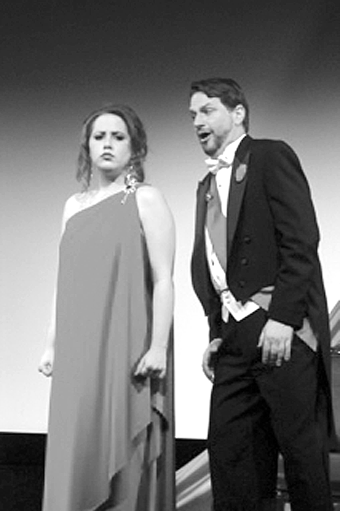Campy staging perks up a stodgy “Dido” at New York Chamber Opera
<< Elizabeth Batton, a queen doomed from the word go, as Dido with Richard Byrne, who made a pale impression as Aeneas, left. Elizabeth Batton as Dido with Karen Frankenstein, the most engaging performer in the New York Chamber Opera production, as Belinda.
Small opera companies spring up in New York like weeds; unfortunately most of these groups are as fragile as hothouse blooms. One of the hardier companies, The New York Chamber Opera, braved wintry weather to present Purcell’s “Dido and Aeneas” in late January.
This opera is one of those pieces that seems to tempt stage directors to do their worst, either flouncing it up with baroque movement or else going all modern and startling. Director Ira Siff avoided these traps adeptly, setting the action in a milieu suggestive of a the mid-20th century. Dido’s court resembled an embassy cocktail reception, with the Carthaginian queen herself (Elizabeth Batton) swathed in the elegantly minimal style of Givenchy’s designs for Audrey Hepburn. Dressy attire for the other characters completed the modern but not overly specific effect.
I appreciated Siff’s delicacy of touch in the more serious scenes, particularly Dido’s celebrated aria “When I am laid in Earth,” which he staged with the utmost simplicity and concentration on the singer. Livelier moments of the score, in particular the Sorceress scenes, offered witty ideas that seemed underdeveloped. Too often, the lead villainess and her witchy sidekicks were left simply to stand and sing.
Dulce Manzini played the Sorceress as a drag king role, strutting about in an outfit that combined a “capitalist” tailcoat with military camouflage. The witches, so the program note informed us, were supposed to represent “the extreme Christian right,” but I have to say that Kyle Church Cheseborough and Terence Wood, in fussy Chanel knockoffs, came off more like Upper East Side ladies who lunch.
The most engaging performer in this production, seen January 24, was soubrette soprano Karen Frankenstein, who played Belinda as a sort of young Delta Burke. Fuller of voice than the singers usually heard in this role, she excelled in the arioso sections, though the divisions were quite acceptably clean as well. Sarah Miller’s subtle acting and world-class trill built the minor role of the Attendant into a star showcase.
In the leading role of Dido, Batton looked regal and offered lush mezzo-soprano tone but lacked variety of affect; this queen was obviously doomed from the word go. Despite his impressive program bio, Richard Byrne made only a pale impression as Aeneas, his baritone sounding strained and white, his stage manner stiff and unalluring. Manzini’s singing was genuinely frightening, though I wonder whether such brassy open vocalism is intentional or just the only way she can get around her register break.
I am a great admirer of conductor Lucy Arner’s witty work as accompanist to Mme. Vera Galupe-Borszkh’s ongoing round of farewell recitals. As such, I felt a little let down at her stodgy tempi for “Dido.” Working with young voices in the small space of the Thalia, she could have encouraged more freedom of rhythm. On the other hand, Arner coaxed rich sonorities from the small band of strings, and the blend of voices in the concerted numbers never turned harsh.
James Jorden is the editor of parterre box, the queer opera zine (parterre.com).
gaycitynews.com



































